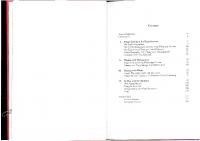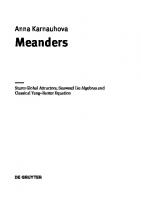Yang Xiong and the Pleasures of Reading and Classical Learning in China 0940490323, 9780940490321
Yang Xiong (53 BC-AD 18), the Han philosophical master remarks at one point in his Exemplary Figures, "Books are as
230 100 16MB
English Pages 158 [79] Year 2011
Recommend Papers

- Author / Uploaded
- Michael Nylan
File loading please wait...
Citation preview
YANG XIONG AND THE PLEASURES OF READING AND CLASSICAL LEARNING IN CHINA
AMERICAN ORIENTAL SERIES VOLUME94
EDITOR- IN-CHIEF
PAUL W. KROLL
By MICHAEL NYLAN
EDITORS
GARY BECKMAN
STEPHANIE W. JAMISON
PERI BEARMAN
AMERICAN ORIENTAL SOCIETY AMERICAN ORIENTAL SOCIETY NEW HAVEN, CONNECTICUT
2011
NEW HAVEN, CONNECTICUT
2011
© Copyright 2011 by The American Oriental Society. All rights reserved. Printed in the United States of America.
Library of Congress Cataloging-in-Publication Data Nylan, Michael. Yang Xiong and the pleasures of reading and classical le arning in China I By Michael Ny Ian. p. cm. - (American oriental series : v. 94) Includes bibliographical references. ISBN 978-0-940490-32- 1 (alk. paper) 1. Yang, Xiong, 53 B.C.-18 A.D.-Books and reading. 2. Yang, Xiong, 53 B.C.- 18 A.D.-Knowledge and learning. 3. Books and reading-China-History. 4. Learning and scholarship-China-History. I. Title. PL2663.Y35Z79 895.1'12-dc22
2011 2011007622
The paper used in this publication meets the minimum requirements of the American National Standard for Infonnation Sciences-Pennanence of Paper for Printed Library Materials, ANSI Z39.48-1984. €9 1 "
To David Knechtges and Paul Kroll Daniel Boyarin and Ramona N addaff Nathan Sivin and Henry Rosemont Michael Loewe and Naomi Richard Jamie Fuller and Gerry Boswell
Contents
Acknowledgments Introduction I.
ix 1
Yang's Life from the Early Sources The Early Biographies The Letters Exchanged between Yang Xiong and Llu Xin The Testimony of Peers and Later Followers Yang's Biography from Chang Qu's Huf:!yangguoz/Ji Anecdotes from the Xijing zaji
9 9 20 24 27 29
Playing with Manuscripts Stages in an Evolving Manuscript Culture Literacy, and Yang Xiong's Intended Readers
32 36 48
III.
Playing with Words Yang's Play with Graphs and Dialogues Yang's Pleasure Theory as It Relates to Classical Learning
62 62 77
IV.
At Play with the Ancients Philological Matters Yang the Historian Background to the Haogu Movement Coda
II.
Works Cited Primary Sources Secondary Sources
99 103 106 108 125
131 131 136
What thou lovest well remains the rest is dross ' What thou lov'st well shall not be reft from thee What thou lov'st well is thy true heritage Pound, "Pisan Cantos"
D o not the archaic script forms and writings seem better to you than the non-standard? (guwen b'!Jouyuye hu 1l"Jt/G~~~m:-!f¥) Liu Xin, Yang's peer and rival
Acknowledgments
Several people helped during various stages in the preparation of this manuscript. Bill Boltz answered queries, as did Miranda Brown and Bill Baxter. Jianye He, reference librarian for Chinese studies at the East Asian Library at Berkeley, was invariably generous with her time, as were the two anonymous readers chosen by the American Oriental Society. Susan Stone gave me sound advice about computers and camera-ready copy, not to mention life. Phyllis Granoff and Koichi Shinohara provided sounding boards at crucial times. This book is dedicated, with great pleasure, to those whose evident love of reading has quickened my own: D avid Knechtges and Paul Kroll, D aniel Boyarin and Ramona Naddaff, Nathan Sivin and Henry Rosemont, Michael Loewe and Naomi Richard, J amie Fuller and Gerry Boswell.
Introduction
ma_
Yang Xiong (53 BC-AD 18), the Han philosophical master, remarks at one point in his Exemplary Figures (Fqyan $~) , "Books are as sexy as women. " 1 Modern readers may frown at a comparison they regard as less than apt. Yang was supremely aware, however, of longstanding traditions, ascribed both to the sages and to the Classics, contrasting the unusual strength of the basic drives for food and sex with the general weakness of the acquired inclinations toward moral behavior. 2 To say that "books are as sexy as women" was to make bold to add to those traditions, adopting the manner of a sage; also to elevate the value of certain texts, at least, to the level of morality itself, insofar as they represented acquired tastes leading to the most desirable aspects of civilized life. Yang's statement is all the more intriguing when placed in the Western Han context, for in his era, as the Fqyan shows, texts were frequently dismissed as the "mere dregs" of the sage's teachings, to be resorted to in the absence of living masters while training for careers in government. 3 One early figure spoke for many when he complained with a sigh, "Reading books makes me sleepy. "4 Another equated the composition
The probable site of the Tianluge Library outside modern Xi'an
1 Fqyan 2/5. More literally, "as alluring as women," with "alluring" implying "sexual appeal" and the "ability to captivate." All refs. for Fayan are to the Han Jing ~.fil9: 1992 edition, hereafter FY. The title is usually rendered Model Sayings or Exemplary Sayings. I have chosen " figures," not only because it connotes "figures o f speech,'' "emblems," "designs, and "images," but also because the Fayan contains many passages that cast the speech, conduct, and writings of famous people as examples for good or ill. 2 See Analects 9/18, 15/13; Mencius 6A/4, 6B/1; also the preface to the Mao Ode (no. 143) "Yue chu" fj tf:}. For newly excavated materials, see Riegel 1977. 3 Significantly, Zhuangzi's famous story about Wheelwright Bian is repeated in HSWZ 5/6 (Hightower, 167) with no objection registered, which suggests that it is not merely a "proto-Daoist" story. See below. Kongzi in Analects 11 /2b spoke of the necessity of reading, but for edification, rather than for pleasure. For Yang's detailed refu tation of the conventional ideas that study and learning are "useless," unless they lead to an official career, see Nylan 2008. 4 See Zha11g110 ce 40/1 4/ 3, for the phrase dush11.yush11i m:tHv~ll!I!. Cf. the complaint regis tered in SJ 24.1221 ("Whenever I listen to ancient music, I am afraid I will fall asleep."), and µji 19.24/102/22 ("Yueji" ~~c).
2
Yang Xiong and Pleasure
of original texts with "torturing oneself. "5 Those conventions notwithstanding, Yang thought exquisitely refined writing - defined as compositions preserved in pre-Qin script or the latter-day productions that captured the spirit of the true pre-Qin masters - as alluring in its forms as any natural beauty: "With women, one hates it when paints interfere with their feminine graces. And with writings, one hates it when over-elaborate phrasing sullies or confounds the model and measure. "6 Many readers before Yang Xiong must have experienced the pleasures of reading, as an idle comment in the Httainanzj suggests. 7 But to experience a pleasure is hardly the same as to write or theorize about it. 8 It was Yang Xiong and several of his contemporaries - especially Liu Xiang ~UrtJ (79-8 BC) and Liu Xin ~U~ (53 BC-AD 23) - who constructed the first serious, sustained, and systematic case for the keen pleasures to be had from reading 9 the Classics. In building this case, Yang and his contemporaries started a trend, fashioning parts of pre-existing arguments into a distinctively new mix, which they traced back, on tenuous grounds, as we now know, to the Duke of Zhou and Kongzi, centuries earlier. 10 This new mix, which I dub haogu ~f ~ ("love of antiquity") for the sake of convenience, was championed by the most famous writers in the centuries after Yang Xiong, so much so that later 5
Xijing zaji 2.89, using the term zj k11 composing texts. 6 FY 2/5.
Er 3,
in connection with Yang Xiong's
See HNZ 21.706 ("Yao Jue" ~~) speaks of writings being enough to "make oneself happy" (zj!e El~). 7
8
Two illustrations should suffice to clarify the distinction between experiencing something and theori7jng about it: (1) No accounts of urban city life in China prior to the twelfth-century Dong;iilf, meng H11a !11 (comp. 1148), supply a vision of a city that is "horizontal" (i.e., embracing all classes) and "integrated" (in the sense of crossing wards); and (2) W. G. Sebald 2003 has noted that nearly no Germans living in the immediate post-World War II cities commented, even in their private diaries, on the destruction of the cities that they w1tnessed every day. 9 HS 8.272; 36.1929, says that Liu Xiang "focused all his thoughts on Classics and the arts" (Jing sh11 ~~ VJt]). 10
See Uezj 4 20/18-21/8, especially the last line's description of Zhongni as one who '\~~uld strum and sing, and intone texts, until the end of his life, without stopping." The origins of the haog11 movement can be traced to the Shiqu Pavilion conference in S1 BC. E lements that would come together in the movement can be found, for example, in a memorial by Yi Feng~*' in 48 BC, two decades or so before Yang's arrival at court, but there is no sign that before Yang and his contemporaries that this movement in anv wav represented a strong challenge to the status quo. · ·
Introduction
3
literarv convention virtually required learned members of the governing elite 11 to express their unbounded delight in reading about antiquity. Echoes of Yang, then, resound in Tao Yuanming's ~tiy)Jfr!BJJ (365-427) "There's pleasure to be had in it [the text],/ Pleasure reaching unto the utmost limits," as in Ge Hong's ~ 5~ (280- ca. 343) line about the Ancients: "They ... diverted themselves with the Classics." 12 This monograph aims to provide a plausible explanation why Yang's particular style of assessing. the distan: past p~ov~d of such enduring appeal to readers over the centuries. To this end, 1t will survey the biographical information that we have for Yang and the state of manuscript culture in Yang's world in relation to authors and authority before turning to consider the close ties between the prevailing pleasure discourse and Yang's distinctive mode of writing, and Yang's leading role as classical master at a classicizing court. Yang expended minimal effort on justifying classical learning for its benefits to family and state, presumably because he felt his readers were readily convinced of learning's utility in those areas. Instead, he argued that 11 reading was critically important to the cultivation of that refined taste" which underpins all well-informed and elegant writing - and this at a time when no author (as opposed to teacher) could hope to make a living from his wntmgs. How fitting, then, that Yang is one of the few early masters to receive a substantive biography that adequately conveys a sense of psychological development. 13 Already in that biography, purportedly based on Yang's autobiography, two competing portraits of Yang contend for 14 supremacy, just as they would in late imperial China. The first depicts the poor, earnest scribbler, abused or ignored by inattentive or obtuse rulers, who is nonetheless hailed as a great poet and thinker by a small band of
11 Thl'. phrase hao,g11, of course, comes from Analects 7/1, wherl'. Kong7.i describes his own love of antiquity. 12 For Tao, see Tian Xiaofei 2005: 148ff. For Ge, see lf/aipian 50/199/10 {yi dianji
z!1v11.l),!J:l!P.iEI~). 13 Yang's Hanshu biography (comp. ca. AD 92) is based hl'.avily on his own autobiography (see below). Jn this Yang was unlike the Zhanguo thinkers and most Han writers. Sima Qian p articipates in the "family enterprise" of learning. Qu Yuan lffi/Jif. (3'" c. BC) and Jia Yi ·~rg'§: (200-127) are two other figures thought to merit full-scale biographies, but both accounts are very brief, if we subtract their writings from their biographies. H Of course, the modern world, even in China, chiefly consigns Yang to oblivion. For example, Victor Mair 1997: 147-52, once (mis)characterized Yang Xiong as a minor figure in the Han; cf. Mair 1994. See also Willard Peterson 1989, who arE-,>ued that Yang Xiong was hardly an innovative or original thinker.
dedicated followers who recognize his genius. (Yang's writings express his profound dissatisfaction that some at court thought him little better than an entertainer for hire.) The second depicts Yang-the-traitor, slavish supporter of the usurper Wang Mang .:E~ (d. 23), the consort clan (1vaiqi )1~,1¥X) regent who seized the throne in AD 9 while posing as a second Duke of Zhou.15 A third portrayal that can be pieced together from Yang's biography is more likely to be true. That third portrait shows Yang enjoying considerable prestige as an authority regularly consulted on important affairs of state, including omen interpretation and foreign policy, despite the elegantly phrased yet forthright stances he used to skewer the Han emperors and his fellow courtiers, annoying powerful factions at the late Western Han court. 16 Yang Xiong's first taste of court life came during the reign of Chengdi (r. 33-7 BC), a classically trained ruler then in thrall to two seductive beauties, Flying Swallow Zhao MHf~~ and her younger sister. 17 Perhaps the sex-drenched atmosphere at court plus the emperor's considerable interest in book learning prompted Yang's little joke about the sexiness of books. 18 (That Yang deplored the emperor's sexual indulgence is evident from a ju dated to 11 BC.) 19 Long before his arrival at court, however, Yang had immersed himself in the study of arcane vocabulary and phrasing, and his lifelong passion for rarified and refined language led him to cast the po:~ntial~ of writing and classical learning in novel yet pleasing ways. Yang's wntmg, m contrast to the "subtle wording" ascribed in Han times to Confucius, supposed author of the Annals (Chunqiu ~f}(), does not lay claim 15
For Yang Xiong as a craven sycophant whose success at court was bought at the price of his integrity, see Su Shi's (1037-1101) "matching poem" to Tao Qian's "Imitating the Ancients," in no. 2 of 9 in the series, line 6 ['tJl)JJtff~tiEJ, Yuan Xingpei ed., 4.342; and Hightower 1970, Poem 48, then matched in a poem by Su Shi recorded in I jn Yixun 2008, 1258-61. I« Yang lambasted the war party of a previous era, in a thinly veiled attack against the expansionists of his own day. He argued in FY 13/29-30 that if the hawks had gotten their.way, the Central States civilization would have been ruined. Today, Yang is s~ldom considered an omen expert, but HS 27B(c).1429, has Yang identifying a "drum omen." 17 For Chengdi as a generally good ruler who could boast superb classical training, as w 14
Y ang's Life
Yang Xiong and Pleasure
own time," he unaccountably in middle age ventured forth from Chengdu to the Han court to make his fortune. 22 The Ju being the literary style most favored at the Han court, his facility in composing display Ju on demand quickly gained him an important patron, after which the emperor asked him to try serving as court poet. 23 He was soon appointed to a 600 bushel rank post, that of Courtier at the Yellow Gate ~F~{~~~ - the same post given to Wang Mang, Llu Xin, and an imperial favorite. And while this is generally regarded as the bottom of the top-tier of the bureaucracy, this was no inconsequential post, since scions of the imperial and 1vaiqi clans served in the same office, which afforded direct access to the emperor's person. Once he became a fixture at court, Yang wrote dazzling occasional pieces depicting his emperor as a paragon of virtue, "equal in merit to that of the legendary Five Lords" of antiquity 24 - when he was not criticizing him! Ostensibly extolling the incredible luxury and brilliance of the court, Yang's poems suggest the degree to which the very splendors enveloping the members of the governing elite distort their perceptions of reality. 25 As those at court sometimes exaggerated their own powers, it is small wonder that the Son of Heaven, who "sedately stands in the midst of precious terraces, leisure lodges, jade finials and petals," found it damnably difficult to "purify His soul, gather His vitality, or concentrate His thoughts." 26 Such Ju pieces, written during Yang's first years at court, no less than Yang's later condemnations of the genre, illustrate the profound ambivalence that he felt as an onlooker and participant in court spectacles. On the one hand, he was awestruck by the court1s magnificence; on the other, he was
since it is difficult to ascertain the dates for Li Hong's life, and p erhaps Yang meant only that h e modeled himself after Li, not that he was a pupil of Li's. 22 For the first quotation, see HS 87A. 3514; DRK 12. Yang was supposedly "over forty" when he travelled from Shu to the capital, where he found an early patron in Wang Yin J:-1§', the Commander-in-Chief. Yang was appointed to the same rank as Wang Mang and Liu Xin, two men wh o clearly remained allies after their service in the 600-bushel post, but we do not know whether Yang was a part of their circle. I suspect that he was on th









